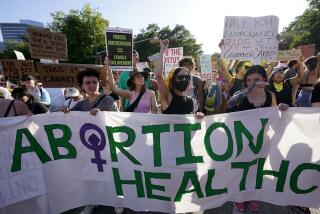Birth Control Leader Fears Authoritarian Curbs : Abortion: The U.S. Supreme Court’s Webster decision could lead to ‘compulsory pregnancy, forced Cesarean sections, surveillance and detention of pregnant women,’ a Planned Parenthood figure warns.
IRVINE — Attempts to restrict abortion might create a police state for human reproduction that would include compulsory pregnancy and surveillance and detention of pregnant women, the second-in-command of the national Planned Parenthood Federation warned Thursday.
“These are the chilling, logical outcomes of laws that protect fetuses at the expense of women’s lives,” said David J. Andrews, Planned Parenthood’s executive vice president. “And we know that the victims of such laws will be the most vulnerable among us--the poor, the young and minorities.”
Andrews issued the grim warning at a dinner marking the 25th anniversary of Planned Parenthood’s county chapter, founded by Marian Garner. About 250 Planned Parenthood supporters attended the event at the Irvine Hilton and Towers in Irvine. Garner was honored at the ceremony.
The county chapter opened in 1965 and offered a birth control clinic one night a week. Today, the local organization, which added a San Bernardino County affiliate in 1988, has a $3-million budget and five clinics open five days a week.
This year, the county chapter plans to open a sixth clinic and offer abortions, sterilizations and prenatal services.
As 20 anti-abortion demonstrators picketed the hotel, Andrews attacked July’s historic U.S. Supreme Court decision that upheld a Missouri law barring abortions in public hospitals and prohibiting public employees from aiding abortions.
In that closely watched Webster case, justices also said Missouri may require doctors to test women at least 20 weeks’ pregnant to see whether their fetuses are viable--and to prevent abortions if they are.
The court, however, stopped far short of overturning 1973’s landmark Roe vs. Wade ruling that legalized abortion, disappointing anti-abortion forces.
“Last July, Americans’ public health and private rights were taken hostage,” Andrews said in his speech. “The Supreme Court’s Webster decision invited states to lay siege to our right to make personal reproductive decisions.”
He added that the Webster decision could lead to “compulsory pregnancy, forced Cesarean sections, surveillance and detention of pregnant women.”
Andrews said several other legal battles are nearing that could disenfranchise teen-agers from their constitutional rights as well. Two cases are pending in Ohio and Minnesota that will determine whether parents should be notified of a minor’s intention to have an abortion.
“You and I know only too well that pregnant teens who don’t involve their parents have very compelling reasons--they might get kicked out, disowned or far worse,” Andrews said.
He cited the example of Becky Bell, 17, of Indiana, who was afraid to seek the parental consent that her state required and later died during an illegal abortion. Her parents are part of a public crusade against Indiana’s consent laws.
Andrews later turned his criticism to the anti-abortion movement, which he likened to the Ku Klux Klan and Nicolae Ceausescu, whose oppressive regime in Romania instituted mandatory pregnancy tests for women factory workers and barred contraceptives as well as abortions.
“When democracy returned to Romania, the new government’s first acts were to legalize abortion and unlicense typewriters,” Andrews said. “This was clear recognition of a truth our leaders refuse to see: Freedom of reproductive choice is as fundamental as the right of free speech and the right of assembly.”
More to Read
Sign up for Essential California
The most important California stories and recommendations in your inbox every morning.
You may occasionally receive promotional content from the Los Angeles Times.











